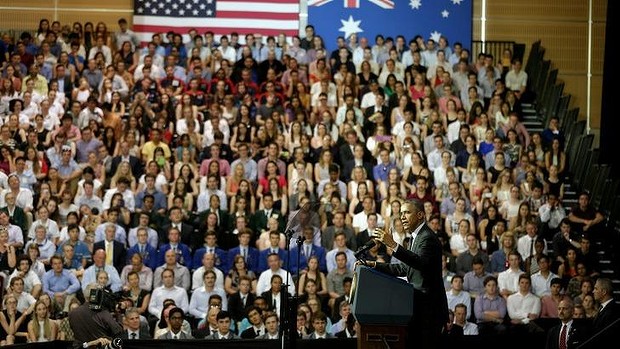The US-China climate pact is shaping as a game-changer in the battle against global warming. [18 November 2014 | Peter Boyer]
When things need doing and authorities are nowhere to be seen, people have a way of filling the gaps. I had this lesson brought home to me at the Australian Network for Plant Conservation’s 10th annual conference in Hobart last week.

“As we focus on our economy we cannot forget the need to lead in the global fight against climate change”: Barak Obama speaking at the University of Queensland in a speech in which he announced a US pledge of $3 billion to a Green Climate Fund to help developing countries deal with climate change. PHOTO ALEX ELLINGHAUSEN
While most science is done by paid professionals aided by technology, human eyes, ears and hands remain in short supply, and that’s where the citizen comes in.
As “citizen scientists”, people with no formal scientific training are guided by trained scientists in collecting data about what’s happening out in the real world. They may also be involved in analysing the data, and sometimes get to be named as co-authors of scientific papers.
As the plant conservation conference heard in numerous presentations, citizen science is taking off in Australia as demand for scientific research rises in inverse proportion to government funding.
Large numbers of ordinary people me are getting down and dirty in field programs across the country, helping science get a better handle on how species and ecosystems are faring on land and, in the case of the Tasmanian-based Redmap scheme, out at sea.
They’re finding species that science had believed extinct, while watching others disappearing before their eyes. They’re catching fish that they’ve never seen before and reporting the catch to Redmap: evidence that the Australian marine environment is changing under our noses.
ClimateWatch, an initiative of Earthwatch Institute in partnership with the Bureau of Meteorology and the University of Melbourne, organises groups around the country to help gather biodiversity data over land and sea around the country, including Tasmania.
Citizen scientists learn through their observations about happenings out in the natural world with immense, profound implications. Their effort rewards them with a precious and unique gift: intimate contact with the planet that sustains them.
It won’t resolve the climate crisis, however. Neither citizen scientists nor any of the countless other volunteers labouring for a sustainable future can manage the heavy lifting that’s badly needed. That must come from government.
In Beijing last week a remarkable thing happened which might just be a game-changer. In the first climate pact between the world’s leading economies, Barak Obama of the United States and Xi Jinping of China stood side by side to announce plans to rein in their countries’ carbon emissions.
Negotiations have been going on behind closed doors for nine months to secure this landmark agreement, under which the US committed to tough new emissions targets and China agreed on a deadline after which its emissions would begin to decline.
The commitment of both countries is not trivial. Obama’s pledge to have emissions in 2025 at least 26 per cent below what they were in 2005 effectively doubles the rate of emissions reduction required under his administration’s earlier commitment.
China’s goal is to have emissions on a downward path by 2030, although it is saying it expects the peak to come earlier. In announcing China’s first-ever emissions target, Xi is locking in an ambitious plan to displace King Coal with Russian gas and renewable energy.
There are obstacles in both countries, inevitable in a strategic shift on this scale. With a hostile majority in Congress Obama can’t get a legislated carbon price. His path is to take executive action under existing clean air laws while vetoing any Congressional bills that try to stop that.
A bigger challenge will be the 2016 US presidential elections. The China deal has ensured that climate change will feature prominently in the campaign to elect Obama’s successor.
The Democratic and Republican party primaries, which begin next year, will be crucial. If public opinion swings strongly behind Obama’s agreement there’s a chance that both parties’ selected candidates will support it too, though right now that looks unlikely.
For his part, Xi faces simmering discontent about the state of air in Chinese cities, laden with polluting particles from heavy industry and coal-fired power stations. If he can give his people blue skies again they will forgive him a great deal, even at the expense of a slowing economy.
The impact of the China-US deal is being felt around the world, but it has delivered a massive shock to the Australian body politic, an unfolding story that I’ll explore next week.
With our own political leadership indifferent to the science of man-made climate change or in outright denial of it, the vision of the leaders of the world’s economic superpowers acknowledging its truth and agreeing on plans to fight it has come as a huge relief.
The labourers in the field, citizen scientists or just plain citizens, have made a big investment – emotional, intellectual and in some cases financial – to try to get the world to see the threat of man-made climate change. To them, this is truly a breath of fresh air.
